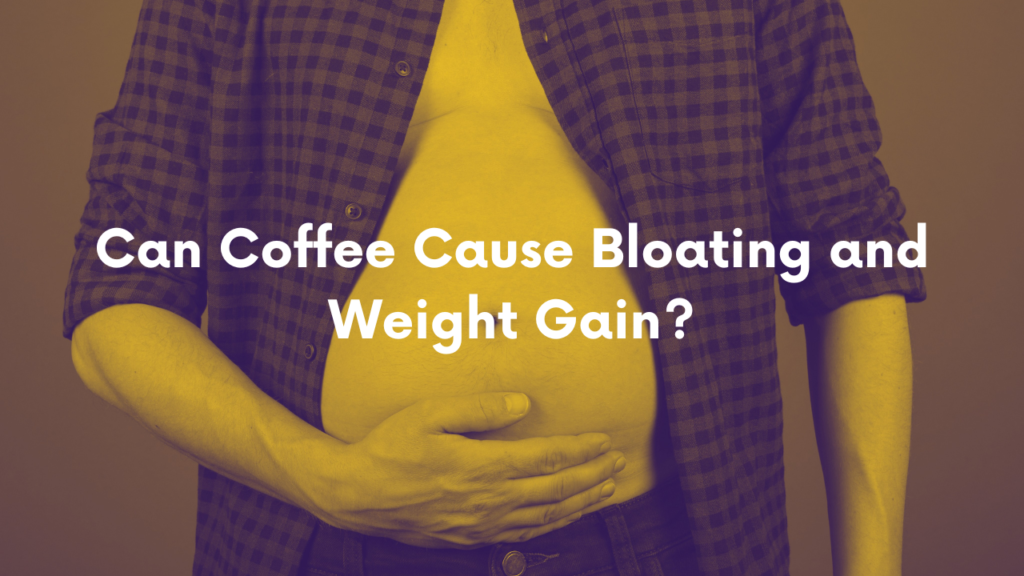
Can coffee cause bloating and weight gain? It’s no secret that coffee is a popular drink – in fact, it’s the second most popular drink worldwide, after water. But what you may not know is that coffee can have some pretty nasty side effects, such as bloating and weight gain.
In this article, we’ll take a closer look at these two potential side effects of coffee and explore why they might occur. We’ll also offer some tips on how to avoid them.
Can Coffee Cause Bloating And Weight Gain?
Coffee is a popular drink, but it can also have some nasty side effects, such as bloating and weight gain. Bloating is a common problem that can cause abdominal discomfort, while weight gain is a potential risk of drinking too much coffee.
So, can coffee really cause bloating and weight gain? The answer is yes – but it’s not necessarily the coffee itself that’s to blame. Rather, it’s the caffeine in coffee that can have these effects. Caffeine is a stimulant that can speed up your heart rate and metabolism, both of which can lead to weight gain.
In addition, caffeine is a diuretic, meaning it causes you to lose water. This can lead to dehydration and bloating. So, if you’re trying to avoid bloating and weight gain, it’s best to limit your intake of caffeine – including coffee.
Why Coffee Can Cause Bloating And Weight Gain
There are many reasons why coffee can cause bloating and weight gain.
Caffeine is a natural diuretic, which means it causes the body to release more urine. This can lead to dehydration, which can cause bloating.
Caffeine can also stimulate the nervous system, which can lead to an increase in heart rate and blood pressure. This can cause the body to hold on to more water, leading to bloating.
Additionally, caffeine is a stimulant, and as such, it can increase feelings of anxiety and stress. This can lead to overeating and weight gain.
Can Decaf Coffee Cause Bloating And Weight Gain?

Many people believe that coffee, whether it is regular or decaf, can cause bloating and weight gain. However, there is limited scientific evidence to support this claim. One study published in the Journal of Nutrition showed that participants who drank caffeinated coffee did not experience any greater weight gain than those who consumed decaffeinated coffee.
Interestingly, another study published in the journal Obesity showed that decaffeinated coffee may actually promote weight loss. This study found that participants who drank four cups of decaffeinated coffee per day lost more weight and body fat than those who didn’t drink any coffee.
While more research is needed to confirm these findings, it seems that decaf coffee may not cause bloating or weight gain after all.
Can Coffee Help With Bloating And Weight Gain?
While coffee can cause bloating and weight gain in some people, it can also help with bloating and weight loss in others. Caffeine is a natural diuretic, meaning it helps the body get rid of excess fluid. This can be helpful for people who are bloated and uncomfortable.
Additionally, caffeine may help increase metabolism and promote weight loss. If you are looking to lose weight, drinking coffee in moderation may be a good option for you.
Reasons Why Coffee Can Cause Bloating And Weight Gain

Caffeine can cause dehydration
Caffeine is a diuretic and can cause dehydration, which can lead to bloating and weight gain. When you’re dehydrated, your body holds on to water to conserve resources, leading to a bloated appearance. Caffeine can also cause weight gain by increasing the appetite and slowing down the metabolism.
Coffee is a diuretic
The caffeine in coffee is a diuretic, meaning it causes the body to expel more urine. This can lead to dehydration, bloating, and weight gain.
When you’re dehydrated, your body holds on to water to conserve resources, leading to a bloated appearance. Caffeine can also cause weight gain by increasing the appetite and slowing down the metabolism.
Caffeine can increase stomach acidity
It is not surprising that coffee can cause bloating and weight gain. Caffeine increases stomach acidity, which can lead to an upset stomach and discomfort. Additionally, caffeine is a diuretic, meaning it causes the body to excrete more fluid.
This can lead to dehydration and bloating. Finally, caffeine may cause weight gain by increasing the appetite or by inhibiting the body’s ability to burn calories.
Coffee can cause an adrenaline rush
There are a few potential reasons why coffee might cause bloating and weight gain. For one, caffeine is a stimulant that can lead to an adrenaline rush. This can cause bloating as the body expands blood vessels and increases the production of stomach acid. Additionally, caffeine can also trigger the release of cortisol, a stress hormone that can lead to weight gain.
What Can Cause Bloating And Weight Gain To Keep Coming Back?

Here are a few other reasons for bloating and weight gain:
Eating too much processed food
Processed foods are typically high in calories, salt, and sugar. Eating too many processed foods can cause you to gain weight and experience bloating. Processed foods can also be low in fiber, which can contribute to constipation and gas. If you want to avoid bloating and weight gain, try to eat mostly unprocessed foods.
Not drinking enough water
Drinking enough water is crucial for good health. However, not drinking enough water can cause bloating and weight gain. When you don’t drink enough water, your body retains fluid in an effort to stay hydrated. This can lead to bloating and a feeling of being bloated all the time. Additionally, if you’re not drinking enough water, you may be less likely to exercise, which can lead to weight gain.
Eating late at night
When you eat late at night, your body has to work harder to digest the food. This can lead to bloating and weight gain. Additionally, if you’re eating high-calorie foods late at night, you’re more likely to gain weight. Late-night eating can also lead to poor sleep quality, which can contribute to weight gain. If you want to avoid bloating and weight gain, try to eat most of your food earlier in the day.
Drinking carbonated drinks
Carbonated drinks, such as sodas and sparkling water, can cause bloating and weight gain. When you drink carbonated drinks, the gas in the drink can expand your stomach, leading to bloating. Additionally, many carbonated drinks are high in sugar and calories, which can lead to weight gain. If you want to avoid bloating and weight gain, try to drink mostly water and unsweetened tea.
Eating unhealthy fats
Unhealthy fats, such as saturated and trans fats, can cause bloating and weight gain. These fats are unhealthy because they can raise your cholesterol levels and increase your risk of heart disease. Additionally, these fats can lead to inflammation, which can cause bloating and weight gain. If you want to avoid bloating and weight gain, try to eat mostly healthy fats, such as omega-3 fatty acids.
Consuming artificial sweeteners
Consuming artificial sweeteners can cause bloating and weight gain. Artificial sweeteners are chemicals that are added to food to make them taste sweet, but they contain few or no calories. Studies have shown that artificial sweeteners can cause weight gain and bloating. One possible explanation is that artificial sweeteners can confuse the brain, causing people to crave sweets even more. Additionally, artificial sweeteners may increase the risk of obesity and metabolic syndrome. If you want to avoid bloating and weight gain, try to avoid artificial sweeteners.
Stress and anxiety
Stress and anxiety can cause bloating and weight gain in a few ways. First, stress can lead to poor eating habits. When you’re stressed, you may be more likely to reach for unhealthy foods, such as processed foods or sugary snacks. These foods are high in calories and can lead to weight gain. Additionally, stress can cause you to eat more than you normally would. This is because when you’re stressed, your body releases the hormone cortisol. Cortisol signals the body to store food as fat, which can lead to weight gain.
Anxiety can also cause bloating and weight gain. When you’re anxious, your body may release the hormone adrenaline. Adrenaline causes the body to store food as energy, which can lead to weight gain. Additionally, anxiety can lead to digestive problems, such as constipation and diarrhea. These problems can cause bloating and a feeling of being bloated all the time.
Sleeping too little or too much
Sleeping too little or too much can cause bloating and weight gain. Sleeping too little can lead to poor eating habits and stress, both of which can cause bloating and weight gain. Additionally, sleeping too little can disrupt the body’s natural hormone balance, which can lead to weight gain.
Sleeping too much can also lead to bloating and weight gain. When you sleep too much, you may be less likely to exercise, which can lead to weight gain. Additionally, sleeping too much can cause you to eat more than you normally would. This is because when you’re sleepy, your body releases the hormone leptin. Leptin signals the body to store food as fat, which can lead to weight gain.
Lack of exercise
Lack of exercise can cause bloating and weight gain in a few ways. First, lack of exercise can lead to poor eating habits. When you don’t exercise, you may be more likely to reach for unhealthy foods, such as processed foods or sugary snacks. These foods are high in calories and can lead to weight gain. Additionally, lack of exercise can cause you to eat more than you normally would. This is because when you’re not active, your body releases the hormone ghrelin. Ghrelin signals the body to store food as fat, which can lead to weight gain.
Second, lack of exercise can cause bloating and weight gain because it disrupts the body’s natural hormone balance. When you don’t exercise, your body produces more cortisol and less testosterone. Cortisol is a stress hormone that signals the body to store food as fat, while testosterone is a muscle-building hormone. By disrupting the body’s natural hormone balance, lack of exercise can cause bloating and weight gain.
Finally, lack of exercise can cause bloating and weight gain because it decreases the amount of calories you burn each day. When you don’t exercise, your body burns fewer calories, which can lead to weight gain over time.
Should You Drink Coffee While Having Bloating And Weight Gain?
There are mixed opinions on whether or not people should drink coffee while having bloating and weight gain. Some people believe that the caffeine in coffee can cause bloating and make it difficult to lose weight, while others believe that the benefits of coffee outweigh the potential downsides.
Ultimately, it is up to each individual to decide what is best for them. If you are experiencing bloating and weight gain and are interested in trying coffee, start by drinking a small amount and seeing how you feel. If you notice any adverse effects, try eliminating coffee from your diet.
Tips To Avoid Bloating And Weight Gain

1. Drink plenty of fluids
2. Avoid sugary drinks and processed foods
3. Eat slowly and chew your food thoroughly
4. Get enough protein and fiber
5. Avoid eating late at night
6. Exercise regularly
Can Coffee Help With Bloating And Weight Gain: The Verdict
There is no definitive answer as to whether or not coffee can cause bloating and weight gain. Some people say that caffeine causes them to bloat, while others believe that the added sugar in many coffees is what leads to weight gain.
The best way to determine if coffee is causing you problems with bloating or weight gain is to cut it out of your diet for a few weeks and see if there is any change. If you don’t notice any difference after cutting out coffee, then it’s probably safe to resume drinking it in moderation.
However, if you do feel better when you don’t drink coffee, then it might be a good idea to avoid it altogether.
If you’re wondering why coffee is causing frequent urination, here’s why.